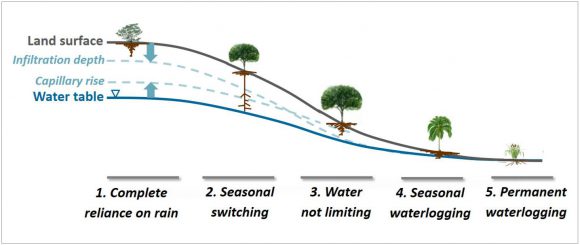
Shepherd’s tree (Boscia albitrunca), native to the Kalahari Desert, has the deepest documented roots: more than 70 meters, or 230 feet, deep. Their depth was discovered accidentally by drillers of groundwater wells. Photo by: Michael Potter.

Tree and plant root depths vary, depending on climate, soil and water conditions, including rainwater infiltration and ground water levels. Ying Fan Reinfelder, professor in the Department of Environmental Sciences.
Charles Darwin once wrote that the tips of plant roots are like the brains of plants, searching for nutrient-rich water. In their quest, some tree roots probe hundreds of feet deep and many send roots through cracks in rocks. The depth of plant roots play a key role in the plants’ adaptation to climate change, says Ying Fan Reinfelder, a professor in the Department of Earth and Planetary Sciences and Department of Environmental Sciences. Reinfelder and her colleagues published their findings online in the Proceedings of the National Academy of Sciences.
Their study demonstrated the relationship between plant roots and water availability, and showed that soil hydrology is the key force driving local and global patterns of root depths. The findings have important implications regarding the ability of trees and plants to adapt to and survive a changing climate through this century and beyond; deeper-rooted plants will have a greater advantage.
Read more about Reinfelders findings in Rutgers Today.

